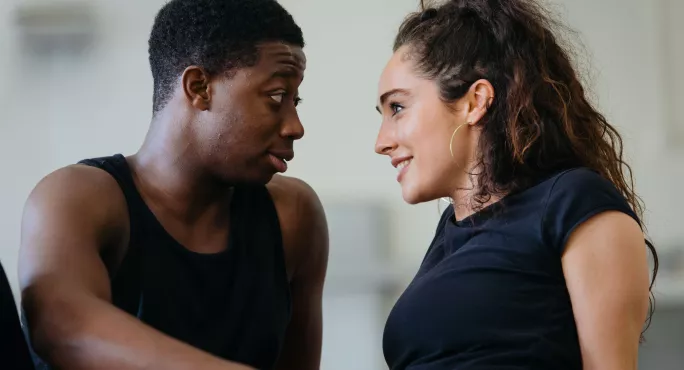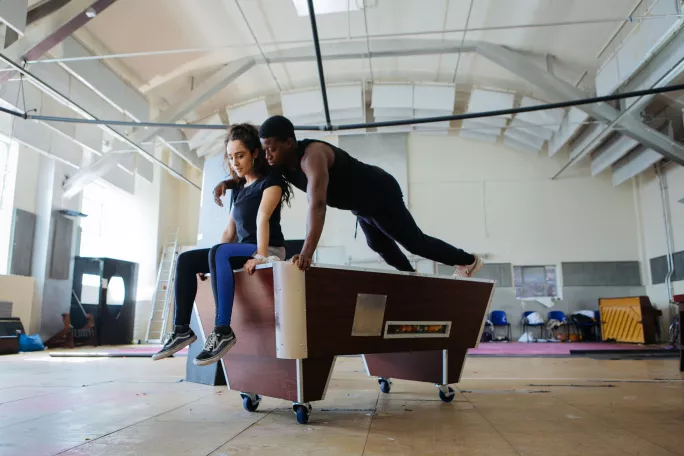- Home
- ‘Schools need to make Shakespeare physical, relevant and experimental’
‘Schools need to make Shakespeare physical, relevant and experimental’

I honestly don’t remember studying Shakespeare in school. I can only imagine that they taught Shakespeare in a way that didn’t stick in your brain - in that line-by-line, “what does the red blood on their hand signify?” way.
Don’t get me wrong, it’s important to discuss and intellectualise Shakespeare. But when you only do that it stays on the page. Shakespeare isn’t meant to be on the page, it’s meant to be up on its feet, spoken, embodied. For me, Shakespeare is a very physical experience.
From September, I am playing the lead in the National Youth Theatre’s production of Frantic Assembly’s Othello, at the Ambassadors Theatre from September. How can my journey from Shakespeare novice to playing one of his best-known roles help schools?
Encountering Shakespeare

Before I began rehearsals, I went to see the show - seeing the movement, the colours and the storytelling live on stage was beautiful. From that point I fell in love with theatre.
My love of Shakespeare took a little longer to develop.
For me, making a text physical brings the work to life. If I had any advice for schools teaching Shakespeare, it would be to get their students to see a text in performance, in action on stage or even on screen. You can’t give Shakespeare to your students stone cold: you have to bring them round to the idea of it and show them how it is still relevant.
Othello, for example, is incredibly relatable for young people because it tackles race relations, jealousy and love. Once you make use of all that and make the play exciting, then they’ll buy into it.
Making connections
You need to be clear in making it relatable. It wasn’t until I worked on one of Benedick’s speeches from Much Ado About Nothing that I first really enjoyed working with Shakespeare and that was because I related to it. I remember speaking this muscular language - “She told me, not thinking I had been myself, that I was the Prince’s jester, that I was duller than a great thaw” - and then suddenly realising that Benedick isn’t saying anything complex, he’s saying exactly what he’s thinking: “she’s taking the mick”. I began to relate to it and the humour in his relationship with Beatrice and the feeling of there being someone you like, but not wanting them to know.
Suddenly, Shakespeare became fun. Learning my lines didn’t feel like I was revising for my Spanish oral anymore. I began to realise that I actually really enjoyed the language itself.
The transformative power of Shakespeare is also important. The thing I love about Shakespeare is it’s all there in the language. With modern plays, so much of what is said is said in the silence, in the pauses, but with Shakespeare there’s no need to “um”, “ah” or even pause because all the feeling is already present in the line. It makes me feel smarter than I am. I’m saying lines that I’d never say in a million years in real life, but while I’m on stage they’re mine to do whatever I like with and it’s empowering.
Word by word
Finally, it’s easy to get the general gist of a line, but I think it’s important to understand the meaning of every word. I’ve found in Shakespeare something as simple as a “but” can change the entire meaning of a speech and flip it on its head. Understanding the nuance gives you confidence in your performance, because you know what you’re talking about - it enables you to make your story more colourful and to really bring the story to life. All of that comes from the text. It begins and ends with the script.
While in school, approaching a text is often about reinforcing the things teachers want you to know about English - about enjambment, onomatopoeia, and metaphors; in the rehearsal room it is about exploring the script and the story it tells, as well as assuming a degree of ownership over it. As a performer you have to experiment and follow your instinct, which is difficult to do in the classroom when you don’t want to embarrass yourself in front of friends. But in the rehearsal room there is no ‘right’ answer, it is a safe space, where you can play, make mistakes, and learn from them, and find the version of Shakespeare that works for you.
Mohammed Mansaray is an actor from Lewisham, South London. He first joined National Youth Theatre in 2014, and now is a member of the NYT REP Company - an alternative to drama school which offers one year of free training. He is playing Othello in National Youth Theatre’s production of Frantic Assembly’s Othello, at the Ambassadors Theatre from September. National Youth Theatre present Frantic Assembly’s Othello at the Ambassadors Theatre 26 September-8 December nyt.org.uk
Want to keep up with the latest education news and opinion? Follow Tes on Twitter and like Tes on Facebook
Keep reading for just £1 per month
You've reached your limit of free articles this month. Subscribe for £1 per month for three months and get:
- Unlimited access to all Tes magazine content
- Exclusive subscriber-only stories
- Award-winning email newsletters